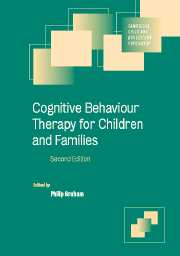Book contents
- Frontmatter
- Contents
- List of contributors
- 1 Introduction
- Part I Developmental cognitive theory and clinical practice
- Part II Engagement and assessment
- Part III Client groups
- Part IV Applications in psychosocial adversity
- Part V Applications in specific child and adolescent psychiatric disorders
- 12 Behavioural approaches to eating and sleeping problems in young children
- 13 Conduct disorders in young children
- 14 Attention deficit hyperactivity disorder
- 15 Children with developmental disabilities and their parents
- 16 Depressive disorders
- 17 Cognitive behavioural psychotherapy for obsessive compulsive disorders
- 18 Anxiety disorders
- 19 School refusal
- 20 Post-traumatic stress disorders
- 21 Disorders of eating control
- 22 Chronic fatigue syndrome
- 23 Children's interpersonal problems
- 24 Pain in childhood
- 25 Conduct disorders in adolescence
- 26 Drug and alcohol abuse
- Part VI CBT applications in preventive interventions
- Index
- References
22 - Chronic fatigue syndrome
Published online by Cambridge University Press: 21 August 2009
- Frontmatter
- Contents
- List of contributors
- 1 Introduction
- Part I Developmental cognitive theory and clinical practice
- Part II Engagement and assessment
- Part III Client groups
- Part IV Applications in psychosocial adversity
- Part V Applications in specific child and adolescent psychiatric disorders
- 12 Behavioural approaches to eating and sleeping problems in young children
- 13 Conduct disorders in young children
- 14 Attention deficit hyperactivity disorder
- 15 Children with developmental disabilities and their parents
- 16 Depressive disorders
- 17 Cognitive behavioural psychotherapy for obsessive compulsive disorders
- 18 Anxiety disorders
- 19 School refusal
- 20 Post-traumatic stress disorders
- 21 Disorders of eating control
- 22 Chronic fatigue syndrome
- 23 Children's interpersonal problems
- 24 Pain in childhood
- 25 Conduct disorders in adolescence
- 26 Drug and alcohol abuse
- Part VI CBT applications in preventive interventions
- Index
- References
Summary
Introduction
Chronic fatigue syndrome (CFS), sometimes known as myalgic encephalomyelitis (ME), is a condition characterized by physical and mental fatigue which is made worse by exercise and is associated with profound disability (Sharpe et al., 1991; Fukuda et al., 1994). The consensus document issued by the three UK Royal Colleges considered the diagnostic criteria developed for adults were equally applicable to children, with the exception of the 6-month criterion, which is considered to be too long for children (Anon, 1996). Muscle pain, headache, sore throat and increased somnolence are typical in children (Marshall et al., 1991; Smith et al., 1991; Feder et al., 1994; Carter et al., 1995) and disability can be profound. Children referred to specialist centres often have had long periods of time away from school accompanied by impairment in social and leisure activities. Loss of peer relationships is frequent (Smith et al., 1991; Feder et al., 1994; Carter et al., 1995). Despite the severity of the condition, a systematic review found that 54–94% of children made good recoveries (Joyce et al., 1997). Good prognostic factors included specific physical triggers to the illness, start of illness in the autumn school term and higher socioeconomic status (Rangel et al., 2000a), while poor prognosis was associated with somatic (de Jong et al., 1997) or biological (Garralda and Rangel, 2001) attributions and illness enhancing cognitions and behaviours of parents as well as physical inactivity (de Jong et al., 1997).
- Type
- Chapter
- Information
- Cognitive Behaviour Therapy for Children and Families , pp. 385 - 401Publisher: Cambridge University PressPrint publication year: 2004

